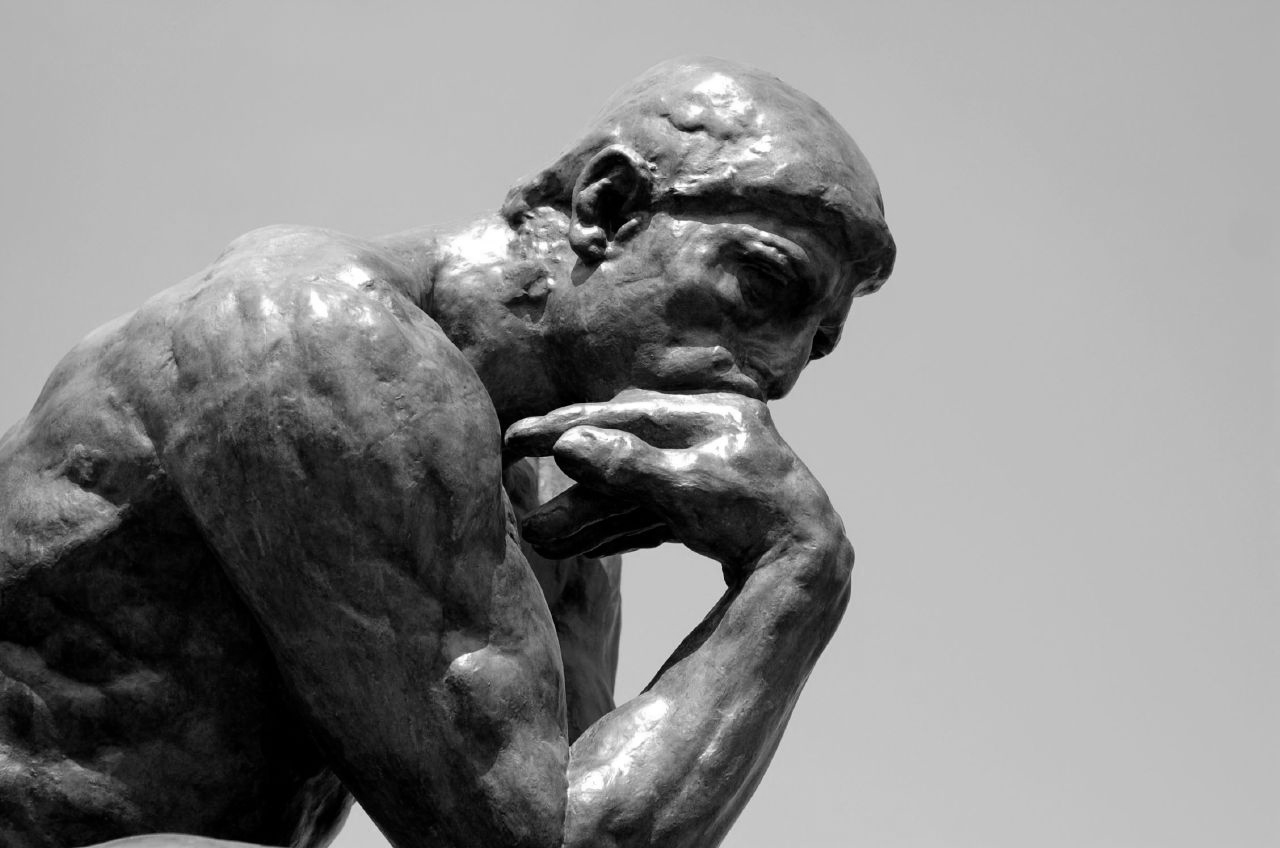Proof: Historical Knowledge
Photo credits: Unknown | CC0
Introduction
When you serve on a jury, you try to determine the guilt or innocence of the accused using historical forms of knowing. Scientific knowledge can be important in the sense of forensic science, but strictly speaking, you cannot rerun the crime in a laboratory experiment. The resources below highlight the historical Israel and the historical Jesus.
Resources on Historical Evidence, Generally
Len Niehoff, Law Professor: Virus Reveals We All Need a Class in Evidence. Detroit Free Press, May 5, 2020.
Alexander Danvers, The U.S. Capitol Rioters' Deeper Cause. Psychology Today, Jan 7, 2021. “What Harper Lee and Kate Manne teach us about Trump’s coup attempt.” Explores To Kill a Mockingbird as an example of white epistemic arrogance, the claim to know history and truth better than others.
Peter Jamison, Hannah Natanson, John Woodrow Cox, and Alex Horton, ‘The Storm is Here’: Ashli Babbitt’s Journey from Capital ‘Guardian’ to Invader. Washington Post, Jan 10, 2021. “The politician she revered above all others had lost an election. She’d struggled with crippling amounts of debt. Her home state of California was locking down again because of a virus she believed was fiction” because of QAnon. Raises the issue of epistemology, media literacy, and knowing.
Ari Melber, Trump Coup Nightmare: See The Moment Fox News Turns Amidst 'Devastating' Smoking Gun. The Beat | MSNBC, Jun 29, 2022. Former Trump Chief of Staff Mick Mulvaney changed his mind about Trump’s culpability based on Cassidy Hutchinson’s testimony before the January 6 Select Committee. A demonstration of how testimony should change minds based on a historical epistemology.
Messages and Resources on the Historical Jesus and the Historical Israel
The Uniqueness of the Jewish People and Jewish Thought
A list of quotations from historians about the religious and sociological uniqueness of Judaism and the Jewish people historically, especially as compared to what other people believed.
Does the Bible Have Evidence of Supernatural Design?
A series of case study comparisons. Why does the Bible begin with monogamy as an ideal, when other traditions begin with polygamy? Why does Genesis 2 indicate that marriage must take priority over family of origin in terms of relational priorities, contrary to every other ancient culture? How did the Bible come to stop kidnapping and promote enormous debt-relief, when the leading cause of people falling into enslavement was debt, then and now? The relational vision expressed by the Bible is unexplainable on naturalistic grounds, and is an argument that good divine Mind was involved in its composition.
Slides of a presentation given December 4, 2021 to the Reconstruction 2021 class. The presentation examines the relationship between the Church and Israel. We begin with the Dead Sea Scrolls and the Qumran Community, who saw themselves as a fulfillment of Israel inviting the rest of Israel to join them. This hinges on a view of the Sinai covenant as an analogy to medical treatment, where God’s role in the sanctuary played the role of a dialysis machine.
The Trinity: Can Other Gods Be Personally Known?
A presentation showing how Jewish monotheism allowed for at least a binitarian God who was both transcendent and immanent at the same time.
The Resurrection of Jesus: Its Historicity and Meaning
A collection of resources on the historicity and meaning of Jesus’ bodily resurrection.
Is There Hard Historical Evidence That Jesus Was Fairly Amazing?
Text of a message on Isaiah 53, long considered to be a prophetic anticipation of hope in a servant-king figure. Jesus claimed to fill to the full this passage, and the New Testament is replete with quotations of it.
Christian Mission: Imperialistic? Authentically Jewish? Am I Called to Do It?
Text and slides of a message on Isaiah 2:1 - 4. Because the Hebrew Scriptures themselves — especially in the poetic hopes of Isaiah — longed for a messianic movement in which people would be called into the reign of the heir of David, it is fundamentally Jewish to hope for good to triumph over evil, and for that hope to be expressed in a meaningful community with leadership. The Christian movement in its origins fulfilled that hope, and was parodied and damaged by imitations.
Part 11: How Pagan Virtue Ethics Opens Up to Christian Faith, Hope, and Love shows how the noble pagan search for virtue ethics was a precursor to Christian love, hope, and faith. The Hobbits grow in love: from mere loyalty to the Shire to sacrificial love for all. Eowyn grows in hope: from hoping for a glorious death in battle to hoping that life and love will outlast death and violence. Finrod, and perhaps Andreth too, grow in faith: to believe that Eru must enter into Arda to heal the Marring.
This presentation is relevant to Proof: Love must relate to all humanity, not just our favorite humans, for what gives us the moral authority to limit a virtue like love? Hope of any sort must be founded on evidence. Faith must offer historical and not just literary data to be evaluated.
00:06:43 Pippin and Merry Grow in Love
00:27:00 Eowyn Grows in Hope
00:40:49 Finrod and Andreth Grow in Faith
01:27:40 How Do We Know?
Other Resources on the Historical Israel
Harold W. Hoehner, Chronological Aspects of the Life of Christ. Zondervan | Amazon page, Mar 1978.
Paul Johnson, A History of the Jews. Harper Perennial | Amazon page, 1988.
Chuck Colson, The House of David. BreakPoint, Aug 6, 1996. On archaeological attestation to King David
Kevin D. Miller, Did the Exodus Never Happen? Christianity Today, Sep 7, 1998.
Thomas Cahill, The Gifts of the Jews: How a Tribe of Desert Nomads Changed the Way Everyone Thinks and Feels. Anchor Books | Amazon page, Aug 1999.
James K. Hoffmeier, Israel in Egypt: The Evidence for the Authenticity of the Exodus Tradition. Oxford University Press | Amazon page, 1999.
Gordon Hugenberger, The Historicity of the Bible. Slides to his class lecture, 2001.
James K. Hoffmeier, Ancient Israel in Sinai: The Evidence for the Authenticity of the Wilderness Tradition. Oxford University Press | Amazon page, 2005.
Kenneth A. Kitchen, On the Reliability of the Old Testament. Eerdmans | Amazon page, 2006.
Roger Isaacs, Passover In Egypt: Did the Exodus Really Happen? Huffington Post, Apr 9, 2011.
Oxford University Press, Ancient Carthaginians Really Did Sacrifice Their Children. Oxford University, Jan 23, 2014. “After decades of scholarship denying that the Carthaginians sacrificed their children, new research has found 'overwhelming' evidence that this ancient civilisation really did carry out the practice.”
N.T. Wright, Israel in Pauline Theology (video, Mar 20, 2014)
Eric Metaxas, Archaeological Evidence for the Exodus and the Trial of Jesus. BreakPoint, Jan 14, 2015.
Joshua Berman, Was There an Exodus? Mosaic Magazine, Mar 2, 2015.
Sara C. Nelson, Goliath Gates of Ancient Biblical City Unearthed by Archaeologists. Huffington Post, May 8, 2015.
Golden Shofar, Critics of the Bible Silenced Again: Archaeological Discoveries Prove Old Testament To Be Accurate. Golden Shofar blog.
Luke Chandler, New Khirbet Qeiyafa Inscription Published; What Does It Say? Bible, Archaeology, Travel with Luke Chandler blog, Jun 3, 2015. On pottery with the name "Eshbaal" from 1 Chr.8:33 and 2 Sam.2 - 4, one of the sons of King Saul, born circa 1047 BC.
Eric Jobe, The Masoretic Hebrew vs. The Septuagint. Ancient Faith blog, Jul 29, 2015. On textual variants.
Nicholas Wade, Modern Technology Unlocks Secrets of a Damaged Biblical Scroll. New York Times, Sep 21, 2016. A good example of textual transmission accuracy.
Ari Rabinovitch, In Unique Discovery, Archaeologists Find King Hezekiah's Seal. Charisma News, Dec 2, 2015.
John Stonestreet, The Discovery of Gath. BreakPoint, Dec 5, 2015. Archaeology confirms the city of Goliath.
Kristin Romey, Has the ‘Signature’ of Biblical Prophet Isaiah Been Discovered? National Geographic, Feb 21, 2018.
Ron Choong, Interview with Merrill Grant. Academy of Christian Thought, Mar 19, 2018. Introduces Choong's explorations into theology, cognitive neuroscience, archaeology, and history.
Gordon Govier, Biblical Archaeology’s Top 10 Discoveries of 2018. Christianity Today, Dec 27, 2018. See also the lists for past years.
Amanda Borschel-Dan, Tiny First Temple Find Could Be First Proof of Aide to Biblical King Josiah. The Times of Israel, Mar 31, 2019. “Rare seal impression from 8th century BCE, bearing the name Nathan-Melech, found in dig at large Iron Age administrative center in Jerusalem’s City of David.”
Henry Abramson, Genesis in Historical Perspective (Jewish History Lab). Henry Abramson, Oct 25, 2020. A 21 minute video.
Henry Abramson, Exodus in Historical Perspective (Jewish History Lab). Henry Abramson, Oct 27, 2020. A 24 minute video.
Henry Abramson, Joshua, Judges, and the Settlement of Ancient Israel (Jewish History Lab). Henry Abramson, Oct 29, 2020. A 15 minute video.
Henry Abramson, The United Monarchy under Kings Saul, David and Solomon (Jewish History Lab). Henry Abramson, Nov 1, 2020. An 18 minute video.
Henry Abramson, The Divided Monarchy of Judah and Israel (Jewish History Lab). Henry Abramson, Nov 3, 2020. A 19 minute video.
Andrew Mark Henry, The Origins of Hebrew. Religion for Breakfast, Apr 14, 2021. Details the archaeological evidence and dominant theories of linguistic development. While the timeline might be shifted earlier because it is based on stonework and ceramic materials, and not papyri, the overall impression is important. From an archaeological perspective, Hebrew appears to be a development taking place between 1000 - 587 BCE in a region with many different linguistic and scribal traditions. It may be a blend of those traditions, reinforcing the biblical portrait of Israel being a multi-ethnic faith community that was designed to be a good neighbor to others.
Matti Friedman, An Archaeological Dig Reignites the Debate Over the Old Testament’s Historical Accuracy. Smithsonian Magazine, Dec 2021. Re: the copper mines in the Timna Valley, once possessed by Egyptians but possibly taken by the Edomites in 1000 BCE, which probably supplied King Solomon.
Amanda Borschel-Dan, Archaeologist Claims to Find Oldest Hebrew Text in Israel, Including the Name of God. The Times of Israel, Mar 24, 2022. “Scholars date tiny ‘curse tablet,’ found at Mt. Ebal, to 1200 BCE – which would prove Israelites were literate when they entered Holy Land; but findings have not been peer-reviewed.” Also would demonstrate that Hebrew was a formal language and had a formal script. See also Appian Media, Mt. Ebal “Curse Tablet” Discovery: Bigger Than the Dead Seas Scrolls? Appian Media, Mar 24, 2022.
Robin Ngo, King Hezekiah in the Bible: Royal Seal of Hezekiah Comes to Light. Biblical Archaeology, Mar 3, 2024. Hezekiah in the Bible and on the ground.
Other Resources on the Historical Jesus
Simon Greenleaf, Testimony of the Evangelists. pdf article, 1846. Co-founder of Harvard Law School explains the investigation that led him to Jesus
G.K. Chesterton, The Everlasting Man. pdf book, 1925.
Gary Habermas, The Resurrection of Jesus: A Rational Inquiry. dissertation, 1976.
Lee Strobel, The Case for Christ: A Journalist's Personal Investigation of the Evidence for Jesus. Zondervan Publishing | Amazon page, Aug 1998.
N.T. Wright, The Resurrection as a Historical Problem. NT Wright Page, 1988.
N.T. Wright, The New Testament and the People of God. Fortress Press | Amazon page, Feb 1992.
N.T. Wright, Jesus and the Victory of God. Fortress Press | Amazon page, Aug 1997.
N.T. Wright, The Resurrection of the Son of God. Fortress Press | Amazon page, Mar 2003.
William Lane Craig vs. Bart Ehrman: Is There Historical Evidence for Jesus' Resurrection. Reasonable Faith, Mar 28, 2006. See also William Lane Craig, Rediscovering the Historical Jesus: The Evidence for Jesus. Reasonable Faith.
Ben Witherington, The Relationship of the OT to the NT According to John Chrysostom. Ben Witherington blog, Aug 28, 2007.
Rodney Stark, Discovering God: The Origins of the Great Religions and the Evolution of Belief. Harper One | Amazon page, 2007. Sociologist Rodney Stark came to Jesus through sociology of religion
Stephen Colbert, Interview with Bart Ehrman. Colbert Report video, Apr 9, 2009. An entertaining defense of the validity of the four Gospel accounts
N.T. Wright, Can a Scientist Believe in the Resurrection. St. Andrew’s, Dec 2007. A video.
Greg Boyd, Is There Archaeological Support for the Reliability of the Gospels? ReKnew blog, Jan 2008.
N.T. Wright, Surprised by Hope. pdf book, Feb 2008.
Greg Boyd, Gospel "Contradictions" and Orality Studies. ReKnew blog, Dec 2008.
David Bentley Hart, The Violence of Christian History. video, Apr 8, 2011.
Peter J. Williams, Eyewitnesses to Jesus? New Evidence for the Authenticity of the Gospels. Veritas Forum lecture Apr 2012.
Gary Habermas, The Resurrection Argument That Changed a Generation of Scholars. Veritas Forum lecture, Nov 2012.
J. Warner Wallace, Cold-Case Christianity: A Homicide Detective Investigates the Claims of the Gospels. David C. Cook Publishing | Amazon page, 2013.
Mikel Del Rosario, Is Good Friday a Myth? What 5 Ancient, Non-Christian Writings Reveal. blog, Mar 2013.
C. Michael Patton, Christianity: The World's Most Falsifiable Religion. July 8, 2013.
David Bentley Hart, Myths About Christian History. video, Jul 18, 2013.
Michael Bird, How God became Jesus: Bart Ehrman Gets It Wrong. ABC News, Apr 16, 2014.
Kevin Diller, Theology's Epistemological Dilemma: How Karl Barth and Alvin Plantinga Provide a Unified Response. Amazon book, Nov 24, 2014.
James Bishop, 23 Reasons Why Scholars Know Jesus Is Not a Copy of Pagan Religions. James Bishop blog, Jan 19, 2015.
Eric Chabot, A Look at the Evidence for the Death, Burial, and Resurrection of Jesus. Think Apologetics blog, Mar 30, 2015.
James Bishop, Extra-Biblical Evidence for the Historical Jesus. James Bishop blog, Apr 5, 2015.
Rachel Marie Stone, What One of the Anti-Vaccination Movement's Least Favorite Doctors Discovered About Jesus. Washington Post, Apr 13, 2015.
The Ten Minute Bible Hour, How We Know Jesus and the Early Church Existed. The Ten Minute Bible Hour, Apr 18, 2015. An excellent 30 minute video
Matthew W. Bates, The Birth of the Trinity: Jesus, God, and Spirit in New Testament and Early Christian Interpretations of the Old Testament. Academia.edu, 2015. An outstanding explanation of prosopological exegesis.
Ariel Sabar, The Unbelievable Tale of Jesus’s Wife. The Atlantic, Jul/Aug 2016. "A hotly contested, supposedly ancient manuscript suggests Christ was married. But believing its origin story—a real-life Da Vinci Code, involving a Harvard professor, a onetime Florida pornographer, and an escape from East Germany—requires a big leap of faith."
Michael Gryboski, Archaeology Discovery: First Century Synagogue Confirms New Testament Accounts of Jesus Christ. Christian Post, Aug 16, 2016. This article should be titled "...New Testament Accounts of Rural Synagogues"!
Eli Yassif, The Jewish Jesus Story. Tablet Magazine, Dec 23, 2016. A fascinating take on a fascinating piece of Jewish literature, the Toledot Yeshu
Lydia McGrew, Hidden in Plain View: Undesigned Coincidences in the Gospels and Acts. DeWard Publishing, Mar 2017. “Revives an argument for the historical reliability of the New Testament that has been largely neglected for more than a hundred years. An undesigned coincidence is an apparently casual, yet puzzle-like “fit” between two or more texts, and its best explanation is that the authors knew the truth about the events they describe or allude to. Connections of this kind among passages in the Gospels, as well as between Acts and the Pauline epistles, give us reason to believe that these documents came from honest eyewitness sources, people “in the know” about the events they relate. Supported by careful research yet accessibly written, Hidden in Plain View provides solid evidence that all Christians can use to defend the Scriptures and the truth of Christianity.” See review by Thomas Horatio, Some Thoughts on Undesigned Coincidences in the Gospels. Thomas Horatio | Medium, Jul 8, 2020. The argument is first credited in 1850 to John James Blunt, Undesigned Coincidences in the Writings Both of the Old and New Testament: An Argument of Their Veracity: With an Appendix, Containing Undesigned ... Between the Gospels and Acts, and Josephus. Public Domain | Amazon page, 1850/2015.
Simon Gathercole, What is the Historical Evidence That Jesus Christ Lived and Died? The Guardian, Apr 14, 2017.
James Bishop, Leading Scholar and Skeptic, Bart Ehrman, Concedes That the Synoptic Gospels Present a Divine Jesus. James Bishop blog, Jan 22, 2018.
Gildas, The Notion of Obligations Comes Before That of Rights. On the Ruin of Britain, Mar 1, 2019. A quote from Simone Weil which has relevance both to history and to philosophy
Tom Holland & AC Grayling, History: Did Christianity Give Us Our Human Values? Unbelievable?, Dec 6, 2019. An 80 minute video of a debate between Holland as a historian and Grayling as a philosopher.
Tom Holland, Why I Changed My Mind About Christianity. Edictum Conference, Mar 14, 2023. A one hour lecture — a personal and professional story of a classical historian who realized that studying the Greek and Roman civilizations was morally disturbing because of the Christian sensibilities and morality that confronted those civilizations.
Sacred Seekers, Ben Shapiro Loses His First Debate!? | Historical Evidence for Jesus Being God | William Lane Craig. Sacred Seekers, Jul 30, 2023. The full debate: Daily Wire, William Lane Craig | The Ben Shapiro Show Sunday Special Ep. 50. Daily Wire, May 12, 2019.
Inspiring Philosophy, How Christianity Smashed the Patriarchy. Inspiring Philosophy, Jan 6, 2023. Draws on the work of historian Tom Holland, Dominion: How the Christian Revolution Remade the World.
Molly Worthen, How a History Professor Changed Her Mind About the Resurrection | Molly Worthen at Texas A&M. Veritas Forum, May 7, 2024. Worthen read N.T. Wright’s work on the historical Israel and historical Jesus.
Nisha Zahid, First Inscription Declaring Jesus as God Found Under Israel Prison. The Greek Reporter, Nov 17, 2024. The Megiddo Mosaic, dating back to circa 230 CE. “The mosaic includes three inscriptions written in ancient Greek, offering glimpses into the faith and community of early Christians. The most notable reads: “The god-loving Akeptous has offered the table to God Jesus Christ as a memorial.””
Proof: Topics:
This section on Proof spotlights Christian faith’s engagement with forms of knowing. Science by itself is supportive but indeterminate as a way of knowing the truth of Christian faith. Philosophy points to some kind of God, or first cause, without being able to go further. History is the primary mode of knowing about Jesus, much like a jury reasoning about the past to determine the proper narrative. Human Personhood highlights our experience of personhood, which corroborates the conclusions of historical investigation about Christian faith and a Christian understanding of human personhood.






